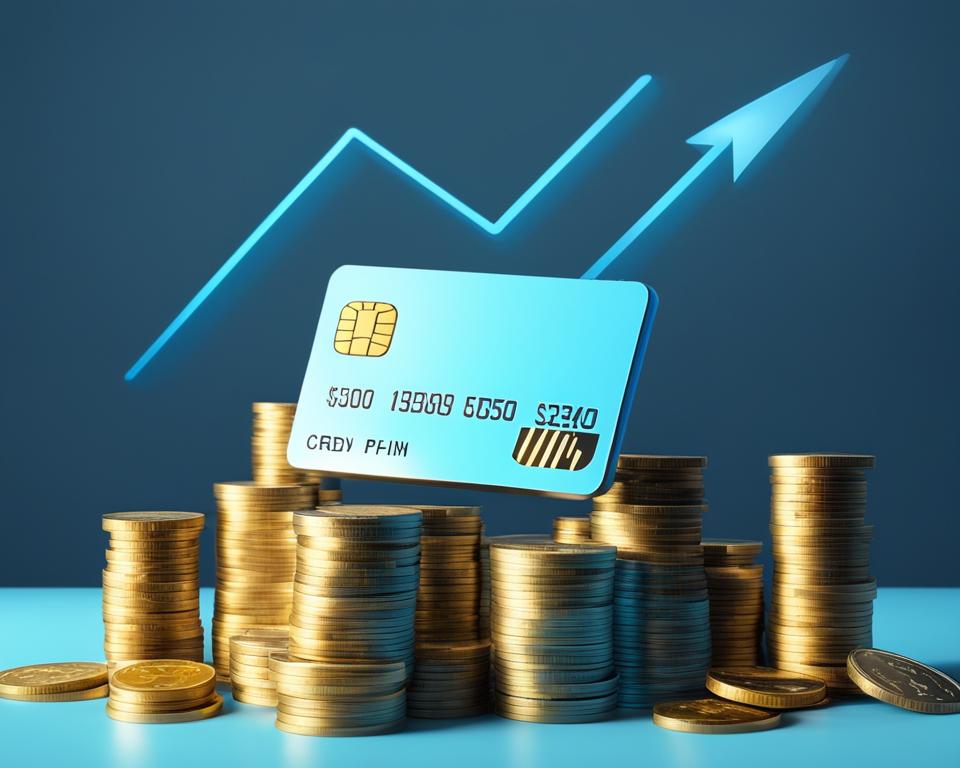Credit cards have long been a subject of debate, with many people questioning their impact on personal finances. However, it is important to separate fact from fiction when it comes to credit cards. In this article, we will explore some common myths and misconceptions surrounding credit cards and shed light on the truth behind them.
While credit cards do come with certain disadvantages and drawbacks, they are not inherently bad or harmful to your finances. Understanding the negative aspects and risks associated with credit cards is crucial in order to make informed decisions about their use.
So, what are the common myths surrounding credit cards? Are credit cards truly damaging to your finances? Let’s uncover the truth about these myths and explore the real impact of credit cards on your financial well-being.
Key Takeaways:
- Credit cards have both advantages and disadvantages, so it’s important to weigh the pros and cons before deciding to use them.
- Understanding and debunking common myths about credit cards can help you make informed financial decisions.
- Credit cards can be harmful if used irresponsibly, but when used wisely, they offer convenience, fraud protection, and rewards programs.
- Managing credit card debt, making on-time payments, and maintaining a low credit utilization ratio are key to avoiding financial harm.
- Regularly monitoring your credit and staying informed about your financial health can help you make better decisions regarding credit card usage.
Myth: Applying for a New Card Affects Your Credit Score
Contrary to popular belief, applying for a new credit card can impact your credit score, even if you don’t use the card. The act of applying for new credit accounts for 10% of your credit score. While the impact may not be significant, frequent applications for new credit can harm your score. It’s important to consider if you truly need a new card before applying.
Applying for a new credit card triggers a hard inquiry on your credit report. This inquiry allows the credit card issuer to access your credit history and determine your creditworthiness. While a single hard inquiry might not affect your credit score much, multiple inquiries within a short period can raise red flags for lenders.
Each hard inquiry has the potential to lower your credit score by a few points. However, the impact typically diminishes over time and disappears completely from your credit report after two years. Small decreases in credit score due to hard inquiries are temporary and can be mitigated by having a solid credit history and keeping your credit utilization low.
The Impact of Multiple Credit Card Applications
Applying for multiple credit cards within a short period is seen as a risk factor by lenders. It suggests that you may be in financial distress or seeking excessive credit. Too many recent credit inquiries can indicate that you are taking on too much debt or are relying heavily on credit.
Multiple credit card applications can have several impacts on your credit score:
- Hard inquiries: Each application results in a hard inquiry on your credit report, which can temporarily lower your score.
- Credit utilization ratio: Applying for new credit cards can increase your overall credit limit, which in turn affects your credit utilization ratio. For example, if you have $10,000 in total credit limits and a $2,500 balance, your utilization ratio is 25%. When you open a new credit card with a $5,000 limit, your utilization ratio drops to 16.7%. Lower utilization ratios are generally better for your credit score.
- New accounts: Every new credit card you successfully apply for adds to your total number of accounts. While this might seem like a positive factor to have more available credit, it can also be seen as a risk if you are piling up too many accounts within a short period.
Keep in mind that everyone’s credit situation is unique, and the impact of applying for new credit cards may vary. It’s crucial to be mindful of your credit score and understand the potential consequences before submitting multiple credit card applications.
“Applying for a new credit card can harm your credit score due to the hard inquiries it generates.”
| Myth | Reality |
|---|---|
| Applying for a new credit card doesn’t affect your credit score. | Each application results in a hard inquiry that can lower your credit score temporarily. |
| Multiple credit card applications are harmless if you don’t use the cards. | Having multiple recent inquiries can raise concerns for lenders and potentially lower your credit score. |
In the next section, we will debunk another common myth: carrying a balance on your credit cards improves your credit score. Stay tuned!
Myth: Carrying a Balance on Your Credit Cards Improves Your Credit Score
One common myth surrounding credit cards is that carrying a balance on them can actually improve your credit score. However, this belief is not entirely accurate. It’s important to understand the factors that truly influence your credit score and how to effectively manage your credit card debt.
Contrary to popular belief, the number of credit cards you have does not directly impact your credit score. Simply carrying a balance on multiple cards will not automatically boost your creditworthiness. Instead, it’s your overall management of these cards that holds more significance in determining your credit score.
The key factors that influence your credit score are your payment history and credit utilization ratio. Payment history accounts for about 35% of your credit score, making it crucial to consistently make payments on time. Late or missed payments can have a detrimental impact on your creditworthiness.
Additionally, the credit utilization ratio, which is the amount of credit you’re using compared to your total credit limit, plays a significant role in your credit score. It is generally recommended to keep your credit utilization ratio below 30% to maintain a healthy score. Carrying a balance on your credit cards increases your credit utilization ratio and may have a negative effect on your credit score.
To effectively manage your credit card debt and improve your credit score:
- Make timely payments: Pay your credit card bills in full and on time to maintain a positive payment history.
- Keep a low credit utilization ratio: Aim to use no more than 30% of your available credit to demonstrate responsible credit management.
- Consider debt consolidation: If you have multiple credit card balances, explore options for consolidating your debt into one loan to simplify repayment and potentially reduce interest charges.
Expert Insight:
“While carrying a balance on your credit cards may seem like a strategy to improve your credit score, it can actually have a negative impact. It’s essential to focus on making timely payments and keeping your credit utilization ratio low to maintain a healthy credit profile.” – Financial Advisor, Sarah Johnson
By understanding the truth behind this credit card myth and taking proactive steps to manage your credit card debt effectively, you can work towards building a strong credit score and financial stability.
Myth: Checking Your Credit Score Lowers Your Score
Checking your own credit score or credit report has no impact on your credit score. It is considered a soft inquiry, which does not affect your score. In fact, regularly monitoring your credit can help you stay informed about your financial health and identify any errors or fraudulent activity.
When it comes to managing your credit, knowledge is power. Checking your credit score allows you to have a clear understanding of where you stand financially and empowers you to take control of your credit. By monitoring your credit regularly, you can ensure the accuracy of the information on your credit report and detect any signs of identity theft or unauthorized activity.
Thanks to advancements in technology, checking your credit score has never been easier. There are various free credit monitoring services available that provide you with access to your credit score and report. These services often offer additional features such as personalized tips to improve your credit, identity theft protection, and credit score simulators.
Whether you’re planning to apply for a loan, rent an apartment, or make a major purchase, having a good credit score is essential. Regularly checking your credit score allows you to track your progress, identify areas for improvement, and make informed financial decisions. It’s important to remember that the key to a healthy credit score is responsible credit management.
The Importance of Soft Inquiries
Soft inquiries, such as checking your own credit score, differ from hard inquiries, which occur when a lender or financial institution pulls your credit report as part of a loan or credit card application. Soft inquiries have no impact on your credit score, while hard inquiries can have a temporary negative effect. It’s crucial to be aware of the distinction between the two and understand when a hard inquiry might occur.
How to Check Your Credit Score
Checking your credit score is a straightforward process. Here are the steps to follow:
- Choose a reputable credit monitoring service or sign up for a free credit score service.
- Create an account and provide the necessary personal information to verify your identity.
- Once your identity is confirmed, you can typically access your credit score and report immediately.
- Review your credit score and report carefully, paying attention to any discrepancies or areas that may need improvement.
- Take advantage of any educational resources or tips provided by the credit monitoring service to enhance your financial knowledge and credit management skills.
By regularly checking your credit score, you can stay on top of your credit health and make proactive decisions to improve your financial well-being. Remember, knowledge is power, and being informed about your credit is an important step towards achieving your financial goals.
| Myth | Reality |
|---|---|
| Checking your own credit score lowers your score | Checking your own credit score is a soft inquiry and does not impact your credit score. |
| Regularly monitoring your credit score helps you stay informed about your financial health. | Regularly monitoring your credit score helps you stay informed about your financial health and identify any errors or fraudulent activity. |
| Knowledge of your credit score allows you to make informed financial decisions. | Knowledge of your credit score allows you to make informed financial decisions and take steps to improve your credit. |
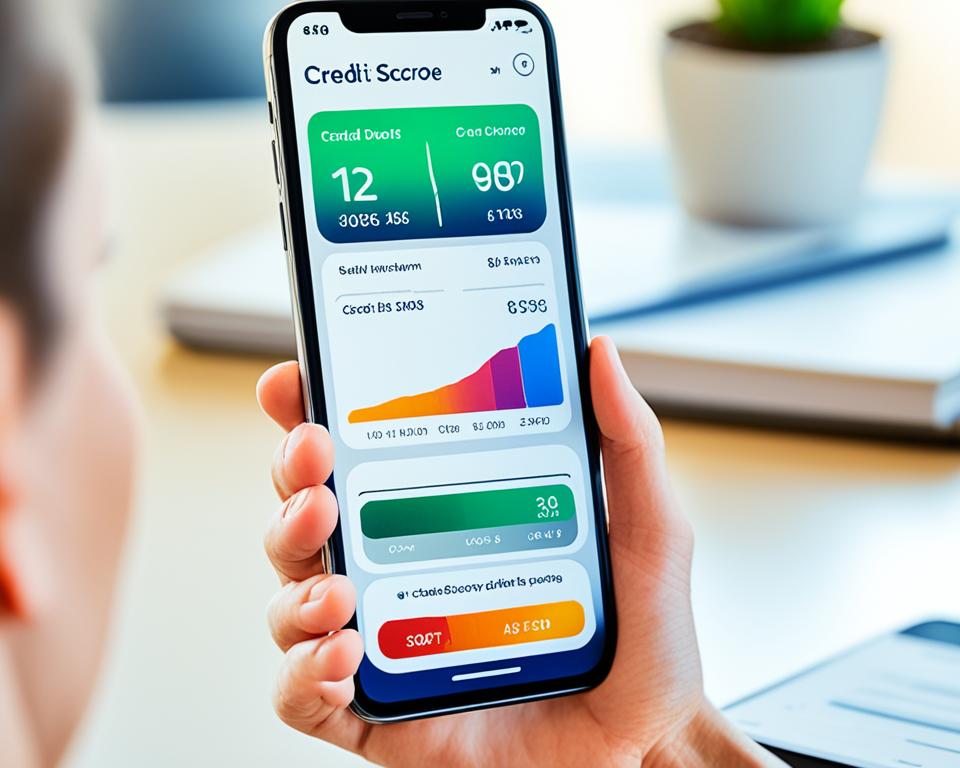
Regularly checking your credit score is an essential part of maintaining good financial health. It empowers you to take charge of your credit, detect any issues early, and work towards improving your credit score. Don’t let the myth of checking your credit score lowering your score prevent you from being proactive about your financial well-being.
Myth: Paying Your Credit Card Multiple Times a Month Improves Your Credit Score
One common myth surrounding credit cards is the belief that making multiple payments throughout the month will improve your credit score. While this practice won’t directly boost your score, it can have an indirect positive impact by keeping your credit utilization ratio low. Let’s explore how multiple credit card payments and your credit utilization ratio affect your overall credit health.
Your credit utilization ratio is the percentage of your available credit that you are currently using. It’s an important factor in determining your creditworthiness and is calculated by dividing your total credit card balances by your total credit limit. Credit scoring models typically consider both your overall utilization ratio and the utilization ratios on individual credit cards.
Making multiple payments on your credit card throughout the month can help keep your average balance low. This can result in a lower utilization ratio, which is generally favorable for your credit score. By paying off your balance more frequently, you’re reducing the amount of outstanding debt reported to the credit bureaus, thereby improving your credit utilization ratio.
For example, let’s say you have a credit card with a $1,000 credit limit. At the end of the month, you have a $500 balance, resulting in a 50% utilization ratio. Instead of waiting until the due date to make a single payment, you decide to make two $250 payments during the month. Each time you make a payment, your utilization ratio decreases, and by the end of the month, your ratio is significantly lower, potentially benefiting your credit score.
It’s important to note that while multiple payments can lower your utilization ratio, it’s just one piece of the credit scoring puzzle. Payment history and overall credit management also play significant roles in determining your creditworthiness.
In summary, while making multiple payments on your credit card throughout the month won’t directly improve your credit score, it can indirectly benefit your score by keeping your credit utilization ratio low. Maintaining a low utilization ratio demonstrates responsible credit management, which can positively impact your creditworthiness over time.
Key Takeaways:
- Making multiple payments on your credit card throughout the month won’t directly improve your credit score.
- Paying your balance more frequently can lower your credit utilization ratio, which may benefit your credit score.
- Credit utilization ratio is the percentage of your available credit that you are currently using.
- Responsibly managing your credit, including making payments on time and keeping balances low, is crucial for maintaining a healthy credit score.
Myth: Missing a Credit Card Payment Immediately Damages Your Credit
In most cases, a missed credit card payment will not immediately damage your credit. Late payments are typically reported to the credit bureaus only when they are 30 days past due.
It’s important to pay your credit card bill on time to avoid late fees and penalty interest rates. Making your payments by the due date helps maintain a positive payment history and demonstrates responsible credit management.
While missing a single payment may not have an immediate impact on your credit score, it’s essential to note that late payments have long-term consequences. Multiple late payments, especially if they become habitual, can significantly damage your credit score.
Late payments can stay on your credit report for up to seven years and can lower your credit score. This can impact your ability to qualify for loans, secure favorable interest rates, or even obtain new credit cards in the future.
“Late payments have the potential to damage your credit score and hinder your financial opportunities. It’s crucial to make timely payments to maintain a positive credit profile.” – Financial Expert
To avoid late payment penalties and protect your credit score, it’s advisable to set up automatic payments or use reminders to ensure you never miss a payment due date. By staying proactive and responsible with your credit card payments, you can maintain financial stability and protect your creditworthiness.
Myth: Carrying a Balance on Your Credit Card Helps Your Credit Score
One common misconception is that carrying a balance on your credit card can actually help improve your credit score. However, this is not true. In fact, carrying a balance can lead to financial drawbacks and even cost you money in interest charges.
Your credit utilization ratio, which is the amount of credit you’re using compared to your total available credit, plays a significant role in determining your credit score. Keeping your credit card balances low or paying them off in full each month is the best way to maintain a healthy credit score.
Having a high credit utilization ratio can negatively impact your credit score because it suggests that you are relying heavily on credit. By keeping your balances low, you demonstrate responsible credit usage and show lenders that you can manage your credit effectively.
Furthermore, carrying a balance means that you are accumulating debt and potentially paying interest charges. This can lead to unnecessary financial stress and may hinder your ability to meet other financial obligations.
Why it’s important to keep your credit utilization ratio low:
“Your credit utilization ratio is an important factor in determining your creditworthiness. Lenders want to see that you’re not maxing out your available credit and that you have the ability to manage your debt responsibly.”
To illustrate the impact of credit utilization on your credit score, let’s take a look at an example:
| Credit Card Balance | Total Available Credit | Credit Utilization Ratio | Credit Score Impact |
|---|---|---|---|
| $500 | $2,000 | 25% | Positive |
| $1,000 | $2,000 | 50% | Negative |
| $2,000 | $2,000 | 100% | Significantly Negative |
As you can see from the example above, maintaining a low credit utilization ratio has a positive impact on your credit score. It is recommended to keep your credit card balances below 30% of your total available credit to maximize your credit score potential.
Ultimately, carrying a balance on your credit card is not advantageous for your credit score. It is best to pay off your balances in full each month to avoid unnecessary interest charges and maintain a healthy credit utilization ratio.
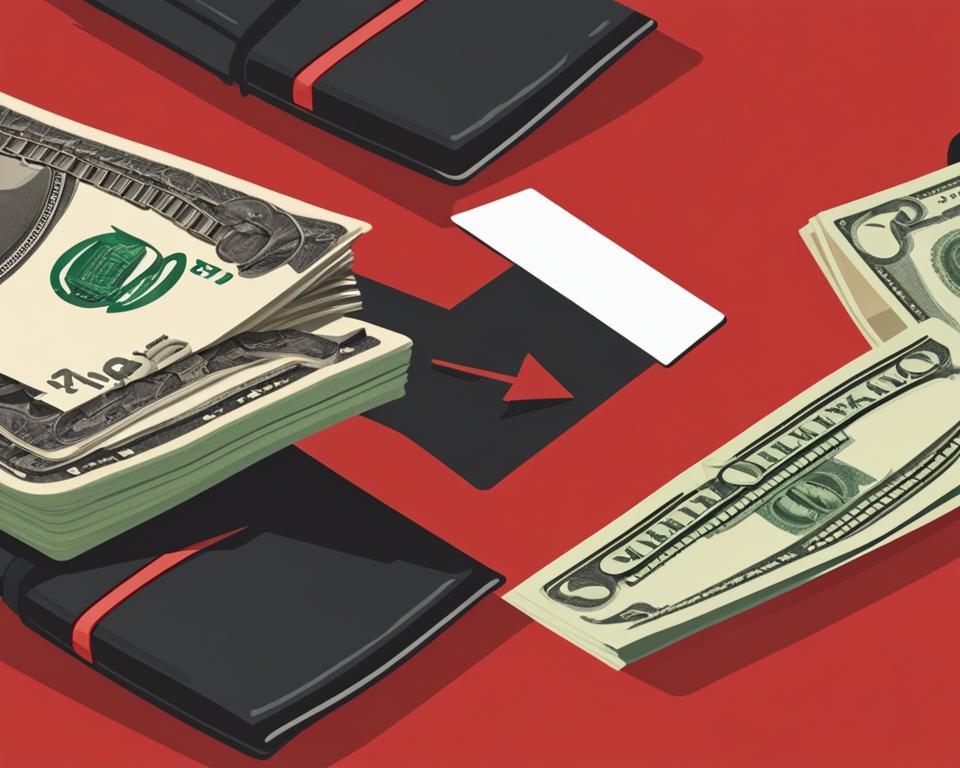
Myth: Checking Your Own Credit Score Has No Impact
One common misconception is that checking your own credit score can negatively impact your credit. However, this is not the case. When you check your own credit score, it is considered a soft inquiry, which has no effect on your credit score. In fact, it’s a good practice to regularly check your credit score to stay informed about your financial health and identify any potential issues.
Monitoring your credit score allows you to have a better understanding of your current financial situation and provides an opportunity to detect any errors or discrepancies that may be affecting your score. Regularly reviewing your credit report can help you identify any unauthorized activities or potential instances of identity theft.
By keeping a close eye on your credit score, you can take proactive measures to maintain or improve your creditworthiness. It’s also important to note that there are various credit monitoring services and tools available that can help you keep track of your credit score more easily. These tools may provide additional features like credit score tracking, alerts for significant changes, and tips for improving your credit health.
“Regularly monitoring your credit score can help you detect any errors or fraudulent activities, allowing you to take immediate action to mitigate any negative impact on your credit standing.” – Financial Expert
Remember, checking your own credit score does not have any impact on your credit. Instead, it empowers you to make informed financial decisions and take control of your credit health.
Benefit of Regular Credit Monitoring
Regular credit monitoring offers several benefits for individuals to stay informed and take control of their financial well-being:
- Identify potential errors or discrepancies on your credit report
- Detect and respond to unauthorized activities or identity theft
- Monitor changes in your credit score over time
- Receive alerts for significant changes to your credit profile
- Track your progress in improving your credit health
By utilizing credit monitoring services or tools, you can actively stay on top of your credit and make more informed decisions when it comes to managing your finances.
Regularly checking your credit score and monitoring your credit health is an important step in maintaining a strong financial foundation. By having a clear understanding of your creditworthiness, you can take the necessary actions to improve your credit score and achieve your financial goals.
Myth: Having Many Credit Cards Lowers Your Credit Score
Contrary to popular belief, the number of credit cards you have does not directly impact your credit score. It’s not about the quantity of cards, but how you manage them that matters when it comes to your creditworthiness. The key factors that influence your credit score are paying your bills on time and maintaining a low credit utilization ratio.
Credit utilization ratio is the percentage of your available credit that you’re currently using. It’s recommended to keep this ratio below 30% to demonstrate responsible credit management. For example, if you have a total credit limit of $10,000 across all your cards, you should aim to keep your total balance below $3,000.
However, it’s important to note that opening multiple credit cards within a short period of time can have a temporary impact on your credit score. When you apply for a new credit card, the lender will make an inquiry on your credit report, which can cause a small dip in your score. This usually rebounds within a few months and is only a minor setback.
“The number of credit cards you have does not directly affect your credit score. It’s how you manage your cards that matters.”
To illustrate this point, let’s refer to the example below:
| Scenario | Credit Limit Across All Cards | Total Balance | Credit Utilization Ratio | Credit Score Impact |
|---|---|---|---|---|
| Scenario A | $10,000 | $3,000 | 30% | No negative impact on credit score |
| Scenario B | $10,000 | $6,000 | 60% | Potential negative impact on credit score |
| Scenario C | $20,000 | $3,000 | 15% | No negative impact on credit score |
In Scenario A, even though the individual has multiple credit cards, they are managing them responsibly with a credit utilization ratio of 30% or below. Consequently, their credit score will not be negatively affected.
On the other hand, in Scenario B, the individual has a high credit utilization ratio of 60%. This can potentially lower their credit score as it indicates a greater reliance on credit and may be seen as a higher risk for lenders.
In Scenario C, the individual has a higher total credit limit across their cards, resulting in a lower credit utilization ratio of 15%. This demonstrates responsible credit management and will not negatively impact their credit score.
So, instead of focusing on the number of credit cards, it’s more important to pay your bills on time and keep your credit utilization ratio low. By doing so, you can effectively manage your credit and maintain a healthy credit score.
Myth: Carrying a Balance on Your Credit Card Can Help Your Credit Score
Contrary to popular belief, carrying a balance on your credit card does not help improve your credit score. In fact, it can have a negative impact, especially if you have a high level of debt. To maintain a healthy credit score and avoid unnecessary interest charges, it is best to pay off your credit card balances in full each month.
Carrying a balance on your credit card means that you have credit card debt, which can increase your credit utilization ratio. The credit utilization ratio is the percentage of your available credit that you are using. A high utilization ratio, typically above 30%, can negatively affect your credit score.
It is important to note that when you carry a balance, you are also subject to interest charges. These charges can add up over time and make it harder to pay off your debt. By paying off your credit card balances in full each month, you avoid these interest charges and save money in the long run.
To maintain a healthy credit score, it is essential to keep your credit utilization ratio low. This can be achieved by paying off your balances in full and using your credit cards responsibly. By doing so, you demonstrate to lenders that you are capable of managing your credit and are a responsible borrower.
Benefits of paying off your credit card balances in full:
- Improves your credit utilization ratio
- Saves money on interest charges
- Builds a positive payment history
- Maintains a healthy credit score
By paying off your credit card balances in full each month, you are taking control of your finances and actively working towards a strong credit profile. This responsible credit management can open doors to better financial opportunities and help you achieve your long-term financial goals.
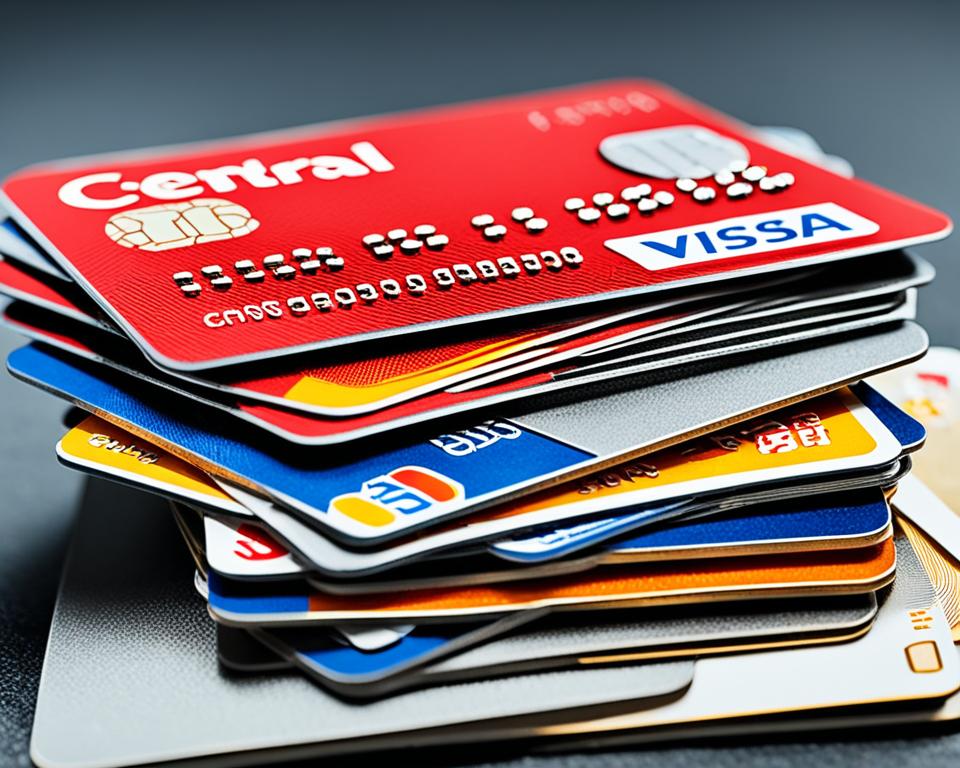
| Myth | Reality |
|---|---|
| Carrying a balance on your credit card helps your credit score | Paying off your credit card balances in full each month improves your credit score |
| High credit utilization ratio | Low credit utilization ratio |
| Accrue interest charges | Save money on interest charges |
Myth: Checking Your Credit Has a Negative Impact
One common myth surrounding credit is that checking your credit has a negative impact on your credit score. However, this is not true. In fact, checking your own credit is considered a soft inquiry, which does not affect your credit score at all.
When you check your credit, whether it’s through a self-check credit service or by requesting a copy of your credit report, it has no bearing on your creditworthiness in the eyes of lenders and creditors.
Regularly monitoring your credit is actually a responsible financial habit that can help you stay informed about your financial health and protect yourself against potential fraud or errors. By checking your credit periodically, you can ensure that all the information on your credit report is accurate and up to date.
“Regularly monitoring your credit is a wise financial practice. It allows you to stay informed about your creditworthiness and detect any potential issues or discrepancies.”
By being proactive and checking your credit on a regular basis, you can identify any errors or fraudulent activity early on and take the necessary steps to rectify the situation. Additionally, monitoring your credit allows you to keep track of your credit score and take steps to improve it if necessary.
So, don’t be afraid to check your credit. It won’t have any negative impact on your credit score, and it can provide you with valuable insights into your financial well-being. Take advantage of self-check credit services or other resources available to you and stay on top of your credit health.
Summary:
- Checking your own credit has no negative impact on your credit score.
- It is considered a soft inquiry, which does not affect your creditworthiness in the eyes of lenders and creditors.
- Regularly monitoring your credit is a responsible financial habit that can help you detect and rectify any errors or fraudulent activity.
- Checking your credit allows you to stay informed about your credit health and take necessary steps to improve your score if needed.
Myth: Paying Utility Bills Improves Your Credit Score
While it’s a common belief that paying utility bills can improve your credit score, this is actually a myth. Traditional credit scoring methods do not consider utility bill payments when calculating your credit score. However, there are alternative credit reporting methods that can include these payments and potentially help build or rebuild your credit score.
Some credit monitoring tools and services allow you to add utility bill payments to your credit reports. This means that while utility bills may not directly impact your credit score, you can still showcase a positive payment history through alternative credit reporting. Including utility bill payments in your credit reports can demonstrate your ability to make regular, on-time payments, which is a factor that lenders may consider when evaluating your creditworthiness.
It’s important to note that not all credit monitoring services offer alternative credit reporting or include utility bill payments in their reports. You may need to research and choose a service that specifically offers this feature. By leveraging such services, you can potentially showcase your responsible payment behavior and improve your creditworthiness.
However, it’s essential to remember that alternative credit reporting methods are not widely adopted by all lenders and financial institutions. Traditional credit scoring models, such as FICO® and VantageScore®, still dominate the lending industry. Therefore, while including utility bill payments in your credit reports may have its benefits, it’s crucial to focus on other aspects of your credit management, such as making timely payments, keeping credit card balances low, and managing other debts.
In conclusion, paying utility bills does not directly impact your credit score according to traditional credit scoring methods. However, alternative credit reporting methods may allow you to showcase a positive payment history in your credit reports. While these methods can be beneficial, it’s important to consider other factors that influence your credit score and financial health.
Myth: Having a Low Credit Score Prevents Qualification for Any Credit Card
Contrary to popular belief, having a low credit score does not necessarily mean you won’t be able to qualify for any credit card. While it may limit your options, there are alternative solutions available, such as secured credit cards, that can help you establish or rebuild your credit.
Secured credit cards are designed for individuals with low credit scores or limited credit history. These cards require a cash deposit as collateral, which serves as a form of security for the credit card issuer. The deposit typically determines your credit limit, and it reduces the risk for the issuer, making it easier to qualify.
By using a secured credit card responsibly, making timely payments, and keeping your credit utilization low, you can begin to improve your credit score over time. This demonstrates to future lenders that you are a responsible borrower, increasing your chances of qualifying for other credit cards and loans in the future.
Benefits of Secured Credit Cards:
- Opportunity to build or rebuild credit
- Potential to qualify even with a low credit score
- Availability for individuals with limited credit history
- Option to upgrade to an unsecured credit card with responsible card usage
Secured credit cards can be a valuable tool on your journey to improving your credit score. They provide an opportunity to demonstrate responsible financial behavior and build a positive credit history. Keep in mind that it’s important to choose a secured credit card with reasonable fees and terms, and to make sure that the card issuer reports to the major credit bureaus, as this is crucial for credit building.
| Pros | Cons |
|---|---|
| Helps establish or rebuild credit | Requires a cash deposit as collateral |
| Provides an opportunity to demonstrate responsible payment behavior | May have annual fees or application fees |
| Potential to upgrade to an unsecured credit card | Lower credit limits compared to traditional credit cards |
Remember, using a secured credit card responsibly is key to improving your credit score. Pay your balance on time and in full, keep your credit utilization ratio low, and avoid carrying a high balance. Over time, as your credit score improves, you may become eligible for other credit cards with better terms and rewards.
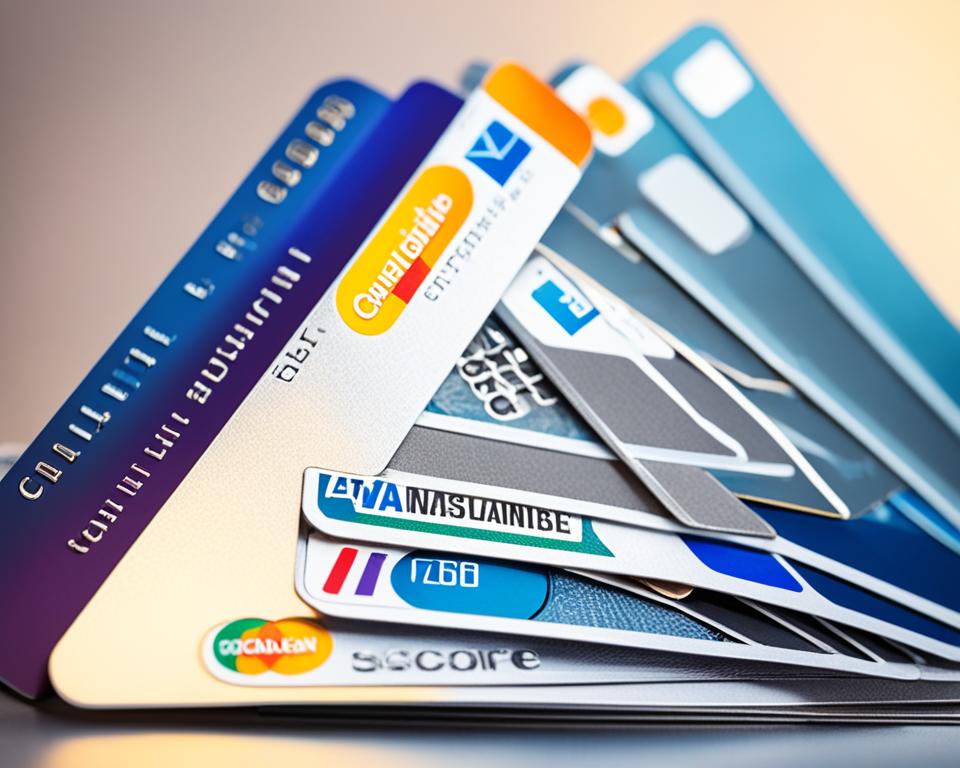
Myth: Paying Off Your Credit Card Balance Each Month Doesn’t Impact Your Credit Score
It is a common misconception that paying off your credit card balance in full each month has no impact on your credit score. However, this myth couldn’t be further from the truth. In fact, paying your credit card balance on time can have a positive effect on your credit score and overall financial health.
When you consistently pay off your credit card balance, you demonstrate responsible credit management, which is a crucial factor in building and maintaining a good credit score. Lenders and financial institutions view individuals who pay their bills on time as low-risk borrowers, which reflects positively on their creditworthiness.
One of the key aspects of credit scoring is the credit utilization ratio, which compares your credit card balances to your credit limits. By paying off your balances in full, you can keep your credit utilization ratio low, which is favorable for your credit score. It shows that you are not relying heavily on credit and are effectively managing your debts.
Additionally, consistently paying off your credit card balance each month can help prevent the accumulation of credit card debt. High credit card debt can negatively impact your credit score and lead to financial strain in the long run. By paying off your balance in full, you avoid interest charges and keep your credit card debt under control.
It is important to note that while paying off your credit card balance each month has positive effects on your credit score, it is still essential to practice responsible credit management in other areas as well. This includes making all payments on time, avoiding excessive credit card debt, and maintaining a healthy mix of credit accounts.
Overall, paying off your credit card balance in full each month not only helps you avoid unnecessary interest charges but also positively impacts your credit score. It reflects responsible credit management and demonstrates to lenders that you can effectively handle credit. So, next time the myth arises that paying off your credit card balance doesn’t matter, remember that it does play a crucial role in maintaining a good credit score and financial well-being.
| Myth | Reality |
|---|---|
| Paying off your credit card balance each month doesn’t impact your credit score. | Paying off your credit card balance each month can have a positive effect on your credit score by maintaining a low credit utilization ratio and demonstrating responsible credit management. |
Myth: Credit Cards Are Bad for Your Finances
While credit cards are often associated with negative aspects, such as high-interest rates and potential debt, they can also offer various benefits that can positively impact your finances. It’s important to understand both the disadvantages and advantages of credit cards in order to make informed decisions about their use.
Disadvantages of Credit Cards:
- High-Interest Rates: One of the major drawbacks of credit cards is the possibility of accumulating high-interest charges if you carry a balance from month to month.
- Potential Debt: Poor spending habits and lack of financial discipline can lead to excessive credit card debt, which can negatively affect your overall financial health.
- Overspending: The convenience of credit cards can sometimes tempt individuals to spend more than they can afford, leading to financial instability.
- Hidden Fees: Some credit cards may come with hidden fees, such as annual fees, late payment fees, or foreign transaction fees, which can add up over time.
Negative Aspects of Credit Cards:
- Impulsive Purchases: Credit cards can make it easy to make impulse purchases without considering the long-term financial consequences.
- Security Risks: If not used responsibly, credit cards can pose security risks, such as the potential for identity theft or fraudulent charges.
- Impact on Credit Score: Mismanagement of credit cards, such as late payments or high credit utilization, can have a negative impact on your credit score.
Financial Impact of Credit Cards:
While credit cards have their downsides, they can also provide financial benefits when used responsibly:
- Convenience: Credit cards offer a convenient and secure way to make purchases, eliminating the need to carry large amounts of cash.
- Fraud Protection: Credit cards often come with built-in fraud protection measures, reducing the risk of financial loss due to unauthorized transactions.
- Rewards Programs: Many credit cards offer rewards programs, allowing cardholders to earn cashback, points, or airline miles for their everyday spending.
- Building Credit History: Properly managing credit cards and making timely payments can help establish and build a positive credit history, which is important for future financial endeavors.
By understanding the disadvantages, negative aspects, and financial impact of credit cards, individuals can make informed decisions about their financial well-being and leverage the benefits while minimizing the risks. It is essential to use credit cards responsibly, maintaining a clear understanding of personal financial capabilities and establishing good money management habits.
Listen to Expert Advice:
“Credit cards can be a double-edged sword in personal finance. While they offer convenience and rewards, they can also lead to financial hardship if misused. It’s crucial to educate yourself about credit cards, establish a budget, and only spend within your means.”
| Disadvantages | Negative Aspects | Financial Impact |
|---|---|---|
| High-Interest Rates | Impulsive Purchases | Convenience |
| Potential Debt | Security Risks | Fraud Protection |
| Overspending | Impact on Credit Score | Rewards Programs |
| Hidden Fees | Building Credit History |
Conclusion
Credit cards are not inherently bad. In fact, they can be powerful financial tools when used responsibly. It is essential to debunk the common myths and misconceptions surrounding credit cards to make informed decisions about their use.
By using credit cards responsibly, such as paying bills on time and managing debt properly, you can leverage their advantages while minimizing any potential disadvantages. Remember, credit cards offer convenience, fraud protection, and rewards programs, making them valuable assets in your financial toolkit.
To make the most of credit cards, it is crucial to understand the importance of responsible usage. This includes avoiding unnecessary debt, paying off balances in full or on time, and maintaining a low credit utilization ratio.
So, don’t be swayed by the negative stereotypes surrounding credit cards. With proper knowledge and responsible practices, you can navigate the world of credit cards effectively and make them work for your financial goals.
FAQ
Are credit cards bad?
Credit cards are not inherently bad. It is important to understand the common myths and misconceptions surrounding credit cards to make informed decisions about their use. By using credit cards responsibly, paying bills on time, and managing your debt properly, you can leverage the advantages of credit cards while minimizing any potential disadvantages.
Does applying for a new card affect your credit score?
Yes, applying for a new credit card can impact your credit score, even if you don’t use the card. The act of applying for new credit accounts for 10% of your credit score. While the impact may not be significant, frequent applications for new credit can harm your score. It’s important to consider if you truly need a new card before applying.
Will carrying a balance on your credit cards improve your credit score?
No, carrying a balance on multiple credit cards does not directly improve your credit score. The number of credit cards you have does not matter as much as how you manage them. Making payments on time and keeping your debt utilization low are key factors in building a strong credit score.
Does checking your credit score lower your score?
No, checking your own credit score or credit report has no impact on your credit score. It is considered a soft inquiry, which does not affect your score. In fact, regularly monitoring your credit can help you stay informed about your financial health and identify any errors or fraudulent activity.
Will paying your credit card multiple times a month improve your credit score?
While making multiple payments on your credit card throughout the month won’t directly improve your credit score, it can indirectly benefit your score by keeping your credit utilization ratio low. By paying your balance more frequently, you can reduce your average credit card balance, resulting in a lower utilization ratio, which is favorable for your credit score.
Does missing a credit card payment immediately damage your credit?
In most cases, a missed credit card payment will not immediately damage your credit. Late payments are typically reported to the credit bureaus only when they are 30 days past due. However, it’s important to pay your credit card bill on time to avoid late fees and penalty interest rates. It’s always best to make your payments by the due date to maintain a positive payment history.
Does carrying a balance on your credit card help your credit score?
No, carrying a balance on your credit card does not help your credit score. In fact, it can cost you money in interest charges. Your credit utilization ratio, which is the amount of credit you’re using compared to your total available credit, is an important factor in your credit score. Keeping your balances low or paying them off in full each month is the best way to maintain a healthy credit score.
Does checking your own credit score have any impact?
Checking your own credit score has no impact on your credit. It is considered a soft inquiry, which does not affect your score. It’s a good practice to regularly check your credit score to stay informed about your financial health and identify any potential issues.
Does having many credit cards lower your credit score?
The number of credit cards you have does not directly affect your credit score. It’s how you manage your cards that matters. Paying your bills on time and keeping your credit utilization ratio low are key factors in maintaining a good credit score. However, opening multiple credit cards within a short period of time can impact your credit score temporarily due to inquiries on your credit report.
Does carrying a balance on your credit card help your credit score?
No, carrying a balance on your credit card does not help your credit score. In fact, it can have a negative impact on your score, especially if you have a high level of debt. Paying off your balances in full each month is the best way to maintain a healthy credit score and avoid unnecessary interest charges.
Does checking your credit have a negative impact?
No, checking your credit has no negative impact on your credit score. When you check your own credit, it is considered a soft inquiry which does not affect your score. Regularly monitoring your credit can help you stay informed about your financial health and identify any potential errors or fraudulent activity.
Do utility bill payments improve your credit score?
While utility bill payments typically do not directly impact your credit score, there are alternative credit reporting methods that can include these payments. Some credit monitoring tools and services allow these payments to be included in your credit reports, which can help build or rebuild your credit score. However, traditional credit scoring methods do not consider utility bill payments when calculating your credit score.
Can you qualify for any credit card with a low credit score?
While a low credit score can limit your options when it comes to credit cards, it does not necessarily prevent you from qualifying for any credit card. There are options such as secured credit cards that can help you build or rebuild your credit score. It’s important to explore your options and choose a credit card that aligns with your financial situation.
Does paying off your credit card balance each month impact your credit score?
No, paying off your credit card balance in full each month does not negatively impact your credit score. In fact, it can have a positive effect by maintaining a low credit utilization ratio. By consistently paying off your balances, you demonstrate responsible credit management, which can help improve your credit score over time.
Are credit cards bad for your finances?
While credit cards can have negative aspects if not used responsibly, they can also offer various benefits. Credit cards provide convenience, fraud protection, and rewards programs. By understanding how to use credit cards wisely and managing your finances effectively, you can avoid the potential drawbacks and take advantage of the benefits they offer.



